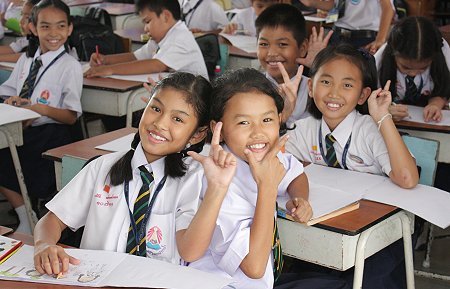The COVID-19 pandemic has resulted in a big rise in the number of poor academic results among students.
The education of about 1.3 million students has suffered since the outbreak hit. A new study shows about 43,060 students decided not to pursue further education.
A total of 128,524 students showed poor academic achievements from the second term of last year to the first term of this year, said Kraiyos Patrawat, deputy managing director of Equitable Education Fund (EEF), citing the results.
Poverty is a big factor in this scenario.
In total, 1.3 million students were grouped in the “extremely poor” category as of the first term of this year, while the number of “poor” and “extremely poor” students was 1.9 million, he said.
This is a high proportion of the 1.9 million students in the compulsory education system, he said. COVID-19 has hit the families of these students, with their average income per month only 1,094 baht, he said.
However, these families have increased their income from state welfare and COVID-19 relief programmes, he said. “We hope this sudden poverty caused by COVID-19 will only be temporary and will fade away soon,” he said.
Of the 43,060 students opting out of school, 33,710 were Mathayom 3 students who decided not to enrol in Mathayom 4 level and 8,699 were Prathom 6 students who decided against enrolling in Mathayom 1, he said.
These students will likely stop studying for good and lose good opportunities in life, he said.
Along with this study, the EEF has also surveyed poor students in 29 provinces and found that up to 87.9% (271,888 people) had difficulties attending online learning during the COVID-19 outbreak due to poor or no access to electricity and devices needed for online studying.
Most of these students were in the southern border provinces of Narathiwat, Yala and Pattani; the northern province of Tak; and the northeastern province of Nakhon Ratchasima, he said.
The number of COVID-19 infections among students has also surged from 65,086 in August to 138,329 early this month, while 366 students have lost their parents to the COVID-19 outbreak, he said. “These students need help. It’s a similar situation to children who became orphans after the 2004 tsunami disaster and who were provided with scholarships to study,” he said.
Society should monitor students at risk of opting out of studying as more students are entering the workforce after the end of their compulsory education rather than carrying on with their studies, he said.
Others make a start on further education but then pull out, citing pressures caused by Covid.






